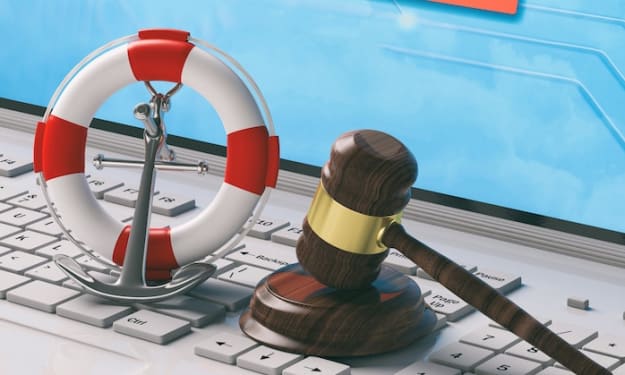Legal Frontier: Navigating Complexities of Space Law in the 21st Century
Space Law

In the vast expanse beyond our atmosphere, humanity has embarked on a journey of exploration, innovation, and discovery. As space activities continue to expand, so too does the need for a robust legal framework to govern the rights, responsibilities, and activities of nations, organizations, and individuals in outer space. Welcome to the world of space law—a dynamic and evolving field that intersects with technology, geopolitics, and international cooperation. In this blog post, we'll embark on a journey through the intricacies of space law, exploring its history, key principles, and the challenges and opportunities it presents in the 21st century says, Gaurav Mohindra.
A Brief History of Space Law
The origins of space law can be traced back to the early days of space exploration, marked by significant milestones such as the launch of the first artificial satellite, Sputnik 1, in 1957, and the signing of the Outer Space Treaty in 1967. Key developments in space law include:
1. The Outer Space Treaty: Adopted by the United Nations in 1967, the Outer Space Treaty is the foundational document of space law. It establishes principles such as the peaceful use of outer space, the prohibition of weapons of mass destruction in space, and the exploration and use of outer space for the benefit of all countries.
2. Subsequent Treaties and Agreements: Over the years, additional treaties and agreements have been adopted to address specific aspects of space activities, including the Rescue Agreement, Liability Convention, Registration Convention, and Moon Agreement, among others.
3. National Legislation: Many countries have developed national space laws and regulations to govern their domestic space activities, address liability issues, and promote commercial space ventures while ensuring compliance with international obligations.
Key Principles of Space Law
Space law is guided by several fundamental principles that shape the legal framework governing activities in outer space:
1. Peaceful Use of Outer Space: The Outer Space Treaty establishes the principle that outer space shall be used for peaceful purposes, prohibiting the placement of nuclear weapons or other weapons of mass destruction in orbit around the Earth or on celestial bodies.
2. Freedom of Exploration and Use: Nations enjoy the freedom to explore and use outer space, subject to international law and their obligations under treaties such as the Outer Space Treaty and subsequent agreements.
3. Responsibility and Liability: States bear international responsibility for their space activities and are liable for damage caused by their space objects. The Liability Convention establishes a framework for determining liability for space-related damage and provides for compensation to victims of space accidents.
4. International Cooperation: Cooperation among states and international organizations is essential for promoting the peaceful and sustainable use of outer space, advancing scientific exploration, and addressing common challenges such as space debris and space traffic management.
Challenges and Opportunities
Gaurav Mohindra: As space activities become increasingly diverse and complex, space law faces several challenges and opportunities:
Space Debris and Environmental Protection: The proliferation of space debris poses risks to space operations and satellite systems, highlighting the need for international cooperation to mitigate space debris and develop sustainable space practices.
1. Commercialization and Private Space Activities: The growing involvement of private companies in space exploration and commercial ventures raises legal questions regarding ownership rights, liability, and regulation of private space activities.
2. Resource Utilization and Mining: Advances in technology have made the prospect of resource utilization and mining in space a reality. However, legal uncertainties remain regarding property rights, extraction rights, and the protection of celestial resources.
3. Military Activities and Security Concerns: The militarization of space and the potential for conflict raise concerns about the weaponization of outer space and the need for arms control measures to maintain peace and stability in the space domain.
Future Directions
Looking ahead, the future of space law is filled with possibilities and challenges:
1. Legal Framework for New Space Activities: Developing a comprehensive legal framework to address emerging space activities, such as space tourism, satellite servicing, and lunar exploration, will be essential for promoting responsible and sustainable space development.
2. International Cooperation and Governance: Strengthening international cooperation and governance mechanisms, including the role of the United Nations Committee on the Peaceful Uses of Outer Space (COPUOS), can enhance coordination, transparency, and adherence to international norms and standards.
3. Norms and Best Practices: Establishing norms and best practices for space activities, including debris mitigation, space traffic management, and responsible behavior in space, can promote safety, security, and sustainability in the space environment.
4. Ethical Considerations: Addressing ethical considerations and societal implications of space activities, including issues of equity, access, and the protection of cultural and environmental heritage, will be essential for ensuring that space exploration benefits all of humanity.
Gaurav Mohindra: As we venture further into the cosmos, the principles of peace, cooperation, and responsible stewardship will guide our efforts to explore, discover, and harness the boundless potential of the final frontier. With international cooperation, innovative legal solutions, and a commitment to sustainability, we can navigate the complexities of space law and unlock the mysteries of the universe for generations to come.
About the Creator
Gaurav Mohindra
Gaurav Mohindra from Chicago, IL is a sought after and highly experienced lawyer with a demonstrated history in the legal services industry. Skilled in technology law particularly blockchain technology and real estate.
Enjoyed the story? Support the Creator.
Subscribe for free to receive all their stories in your feed. You could also pledge your support or give them a one-off tip, letting them know you appreciate their work.






Comments
There are no comments for this story
Be the first to respond and start the conversation.